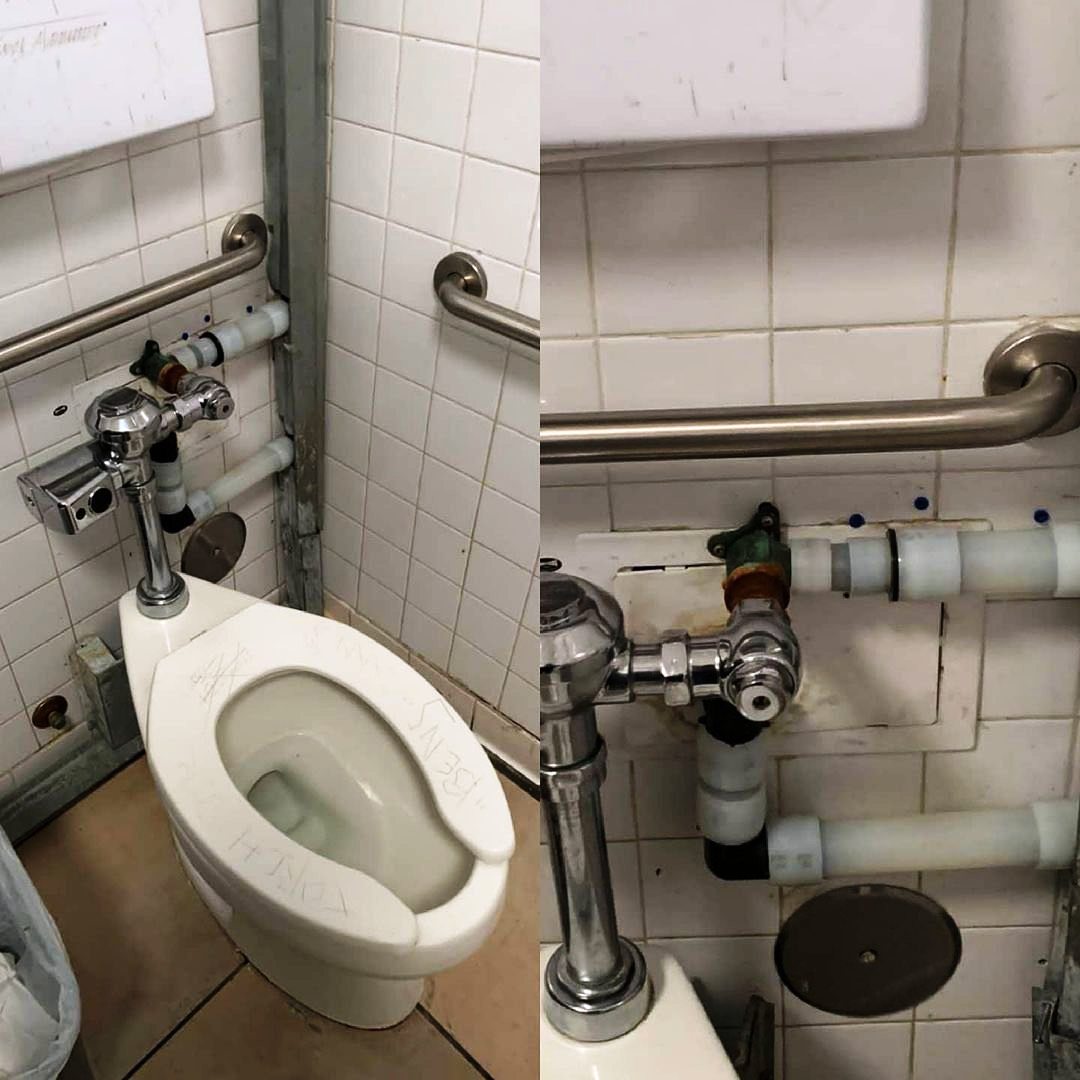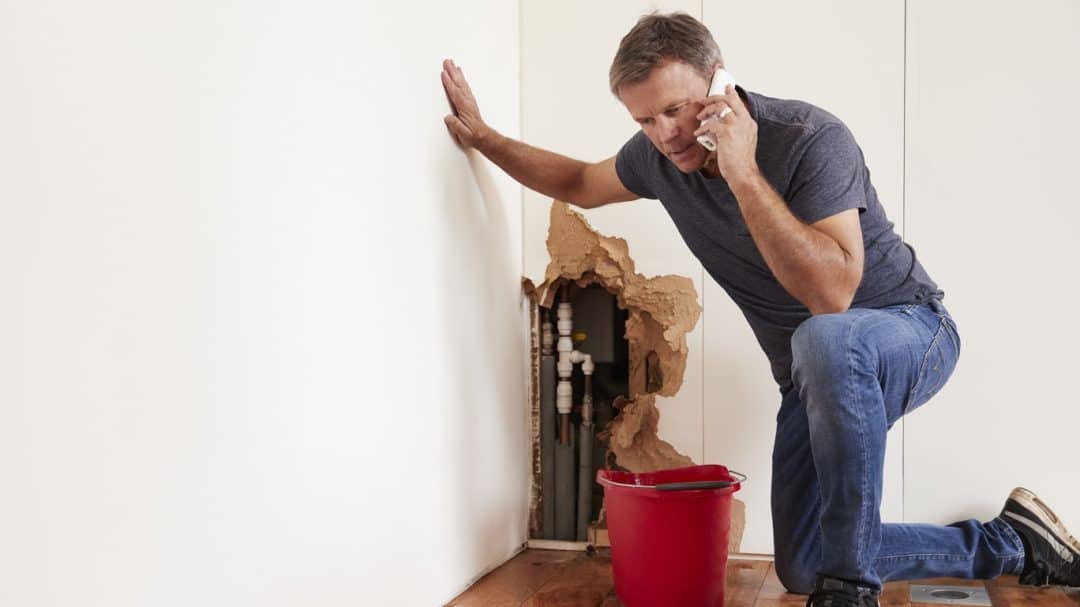Are you currently searching for facts and techniques around Why Do My Plumbing Pipes Make A Knocking Noise?

To identify loud plumbing, it is very important to figure out very first whether the undesirable noises happen on the system's inlet side-in other words, when water is turned on-or on the drain side. Noises on the inlet side have differed reasons: too much water stress, used valve as well as faucet parts, poorly linked pumps or various other home appliances, improperly placed pipe bolts, and also plumbing runs consisting of a lot of tight bends or other restrictions. Sounds on the drainpipe side normally come from poor location or, as with some inlet side sound, a design including tight bends.
Hissing
Hissing noise that takes place when a tap is opened somewhat generally signals excessive water stress. Consult your regional water company if you suspect this trouble; it will certainly be able to tell you the water stress in your location and can install a pressurereducing shutoff on the incoming water supply pipeline if needed.
Other Inlet Side Noises
Creaking, squealing, scraping, snapping, and also tapping usually are brought on by the growth or contraction of pipelines, normally copper ones supplying warm water. The noises occur as the pipelines slide against loose bolts or strike nearby residence framework. You can frequently determine the place of the problem if the pipelines are exposed; simply comply with the sound when the pipelines are making noise. More than likely you will uncover a loosened pipe wall mount or an area where pipelines lie so near floor joists or various other framing items that they clatter against them. Affixing foam pipeline insulation around the pipes at the point of get in touch with should correct the problem. Make certain bands and wall mounts are protected and also offer ample support. Where feasible, pipe bolts should be connected to massive architectural components such as foundation wall surfaces instead of to mounting; doing so lessens the transmission of resonances from plumbing to surface areas that can enhance and also transfer them. If connecting bolts to framing is inescapable, wrap pipes with insulation or various other resilient product where they contact fasteners, and also sandwich the ends of new bolts between rubber washers when mounting them.
Correcting plumbing runs that experience flow-restricting limited or numerous bends is a last hope that must be undertaken only after getting in touch with an experienced plumbing specialist. However, this situation is relatively usual in older houses that may not have been constructed with interior plumbing or that have seen several remodels, particularly by beginners.
Babbling or Screeching
Intense chattering or shrieking that takes place when a shutoff or faucet is turned on, and that normally goes away when the installation is opened fully, signals loose or faulty interior components. The remedy is to change the valve or faucet with a new one.
Pumps as well as home appliances such as cleaning equipments and also dish washers can move electric motor noise to pipes if they are improperly connected. Link such products to plumbing with plastic or rubber hoses-never stiff pipe-to isolate them.
Drain Sound
On the drainpipe side of plumbing, the principal objectives are to remove surface areas that can be struck by falling or rushing water as well as to protect pipes to consist of inevitable noises.
In brand-new building, bathtubs, shower stalls, toilets, and wallmounted sinks and basins should be set on or against resilient underlayments to reduce the transmission of sound via them. Water-saving commodes and also taps are much less loud than traditional designs; install them instead of older kinds even if codes in your location still permit using older components.
Drains that do not run up and down to the basement or that branch into straight pipe runs supported at flooring joists or various other framing present specifically bothersome noise problems. Such pipelines are big enough to emit substantial vibration; they also lug considerable amounts of water, which makes the situation worse. In brand-new building and construction, define cast-iron soil pipes (the huge pipelines that drain toilets) if you can manage them. Their enormity consists of much of the sound made by water travelling through them. Likewise, prevent routing drains in wall surfaces shared with bedrooms and also spaces where people collect. Wall surfaces including drainpipes need to be soundproofed as was explained earlier, making use of dual panels of sound-insulating fiberboard and also wallboard. Pipelines themselves can be wrapped with unique fiberglass insulation produced the purpose; such pipelines have an invulnerable vinyl skin (occasionally consisting of lead). Results are not constantly satisfying.
Thudding
Thudding noise, usually accompanied by shuddering pipelines, when a faucet or appliance shutoff is shut off is a problem called water hammer. The sound and resonance are caused by the resounding wave of pressure in the water, which suddenly has no location to go. In some cases opening up a valve that releases water rapidly right into a section of piping containing a limitation, elbow, or tee installation can produce the exact same condition.
Water hammer can normally be cured by setting up fittings called air chambers or shock absorbers in the plumbing to which the issue shutoffs or faucets are attached. These gadgets permit the shock wave created by the halted circulation of water to dissipate in the air they consist of, which (unlike water) is compressible.
Older plumbing systems may have short upright sections of capped pipeline behind walls on faucet competes the exact same objective; these can eventually full of water, reducing or ruining their performance. The cure is to drain pipes the water supply totally by shutting down the main supply of water shutoff and opening all taps. Then open the major supply shutoff and shut the taps one at a time, starting with the tap nearest the valve as well as finishing with the one farthest away.
Pipe Down! What to Do About Noisy Water Pipes
Banging
Does it sound like someone's hitting your pipes with a hammer every time you run water? The issue could be a phenomenon called water hammer, which happens when a water valve closes suddenly. You'll often hear it when your washing machine stops filling, for example. The momentum and pressure from the water flowing toward the valve create the shockwave that causes the banging noise when the valve closes suddenly. It might not seem like a big deal, but water hammer can cause damage to your pipes, including leaks and joint damage.
One way to ease water hammer is by installing water hammer arrestors. Your plumber can install them near major valves to help cushion the shock of the water when it suddenly stops or changes direction. You might also need to reduce the water pressure coming into your home with the pressure-reducing valve.
Gurgling
Gurgling sounds typically come from drainpipes. This sound happens when the water can't drain properly, usually when there's a clog in the water pipes. Drain clogs often happen due to hair, grease, soap scum or objects that fall down the drain. They can happen suddenly or build up slowly over time.
You can sometimes clear a clogged drainpipe with a plunger to help force the clog through the pipe. A plumbing snake or an auger can also help break up tough clogs. A common plumbing myth is that chemical drain cleaners are safe and effective, but they often don't work and contain harsh chemicals that can hurt you and your plumbing. If you can't remove the clog with a plunger or snake, it's best to call a plumber to help.
Rattling
Water travels through your pipes with lots of pressure, so the pipes are bound to move a little. Pipes should be secured well to keep them from moving too much when water runs through them. If they're not properly fastened or the fasteners come loose, you might hear them rattling when you run water.
Resecuring the pipes can cut down on the rattling noise and prevent damage to the joints of the water pipes. However, many pipes run behind walls where you can't easily access them. A plumber can help determine if loose fasteners are the cause of the rattling and resecure them if necessary.
Humming
If your pipes sound like they're humming, it's likely a water pressure issue. When the water pressure is high, it can cause the water pipes to vibrate and create a humming sound. High water pressure is more common if you have a well for your water, but it can happen with municipal water as well. High water pressure can damage your plumbing and cause leaks.
If you have a well, check the pressure to ensure it's below 55 pounds per square inch. A plumber can test the pressure for you and help adjust the issue if you're not sure how to do it yourself. If you're connected to the municipal water source, your home likely has a pressure-reducing valve near where the water enters your home. You can adjust the screw in the valve to decrease the pressure, but be careful not to lower it too much.
Squeaking
Squeaking or squealing is another common sound you'll hear in your water pipes. This often happens if small components within the plumbing, such as washers or aerators, become loose, dirty or damaged. When this is the cause, the squeaking sound is usually confined to a certain fixture or area of plumbing. Replaced or repairing the part should solve the noise.
If you can hear the squealing sound everywhere in your home, it could be an issue with water pressure. Buildup in the pipes narrows the space for the water, which can cause squealing as the water tries to squeeze through the pipes. Wear and tear on the plumbing system can also cause whistling or squeaking. These situations typically require a professional plumber to diagnose and repair.
https://www.homeserve.com/en-us/blog/home-improvement/water-pipes-making-noise/

Do you really like reading about Why Do My Pipes Make Noises? Give feedback further down. We'd be pleased to find out your opinions about this posting. We are looking forward that you visit us again later on. Loved our blog entry? Please share it. Help another person check it out. Thank you for going through it.
Book Instantly
Comments on “Hiring the Pros: Typical Home Appliance Troubles Best Left to Plumbers”